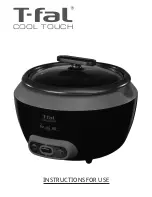
11
4.
Check the levelness of the washer by first placing a level on the lid near the console.
Next, place the level on the side of the washer in the crease between the top of the
washer and the cabinet.
Level the front.
Level the side.
5.
If the washer is not level, move the washer out slightly, tip back, prop up the front of the
washer on a wood block. Adjust the feet up or down as necessary by twisting the feet.
Repeat steps 1 through 4 until washer is level.
6.
Use a
⁹
/
₁₆
" or 14 mm open-end wrench to turn the locknut counterclockwise on the foot
tightly against the washer cabinet.
IMPORTANT:
If the locknut is not tight against the washer cabinet, the washer may
vibrate.
Complete Installation
1.
Check the electrical requirements. Be sure that you have the correct electrical supply and
the recommended grounding method. See “Electrical Requirements.”
2.
Check that all parts are now installed. If there is an extra part, go back through the steps to
see which step was skipped.
3.
Check that you have all of your tools.
4.
Keep the foam packing ring from the washer tub in case you need to move the washer in
the future. Dispose of/recycle all packaging materials.
5.
Check that the water faucets are on.
6.
Check for leaks around faucets and inlet hoses.
7.
Plug into a grounded 3 prong outlet.
8.
Remove any protective film or tape remaining on the washer.
9.
Read “Washer Use.”
10.
To test and to clean your washer, measure
¹⁄₂
of the detergent manufacturer’s
recommended amount of powdered or liquid detergent for a medium-size load and pour
it into the detergent dispenser. Close the lid. Press POWER. Select a normal cycle and
press Start. Allow it to complete one whole cycle.
Electrical Shock Hazard
Plug into a grounded 3 prong outlet.
Do not remove ground prong.
Do not use an adapter.
Do not use an extension cord.
Failure to follow these instructions can result in death,
fire, or electrical shock.
WARNING












































